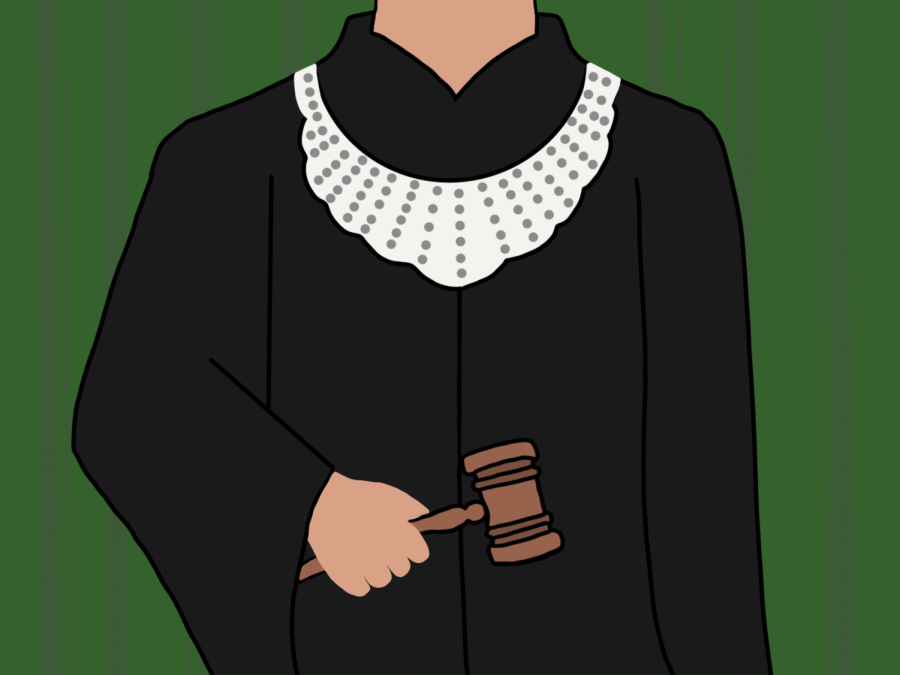Students, professors reflect on Ruth Bader Ginsburg’s passing and legacy
September 28, 2020
For Erica Fisher, Ruth Bader Ginsburg’s death was more than the loss of a Supreme Court justice — it was the loss of an icon.
“When I think of an icon when it comes to policy, civil rights action, legislation, forefront thinking — the first person I think of is RBG,” Fisher, a senior and vice president of Pitt’s chapter of national pre-law fraternity Phi Alpha Delta, said.
She said Ginsburg, who was also a member of Phi Alpha Delta, helped inspire her interest in law.
“She was one of the main reasons why I was interested in law. I’m a Jewish woman, she’s a Jewish woman. I just admire the way she was brought up,” Fisher said.
Ginsburg was appointed to the Supreme Court in 1993 and served until her death on Sept. 18. The second woman ever to be appointed to the Supreme Court, she became known for advocating for gender equality.
Jerry Dickinson, an associate professor at Pitt’s School of Law, said he thinks Ginsburg was a legend. Ginsburg famously dissented against the decision in the case of Shelby County v. Holder, the civil rights case from 2013 related to the Voting Rights Act, which made it more difficult for Black people to vote.
“She was well known for being the powerful dissenter of the batch,” Dickinson said. “We’re aspiring for a society of equality and an understanding that we need to be cognizant of the law oppressing the marginalized and disadvantaged.”
Tyler Viljaste, vice president of Student Government Board, said Ginsburg was an important figure in his life as well.
“RBG represented a strong, courageous, virtuous woman that inspired me to want to get into law. She and her memory proves that getting involved in the law is one good way of trying to bring about real change — through the courts,” Viljaste, a junior studying politics and philosophy and finance, said.
Ginsburg’s death means her position on the Supreme Court will need to be filled. President Donald Trump nominated Amy Coney Barrett — a circuit judge on the U.S. Court of Appeals for the seventh circuit — on Saturday.
Viljaste said Ginsburg was an essential part of keeping balance within the Supreme Court.
“It also worried me because it gives Trump the opportunity to construct a court with a decidedly conservative slant (6-3), which is dangerous, as [in] face less variety of perspective is dangerous for the Supreme Court,” Viljaste said.
Viljiaste said he thinks the entire nation, including Pitt students and Pittsburghers, will feel the negative impact of Ginsburg’s passing.
“Pitt students will surely feel the reverberations of a vastly more conservative Supreme Court in a negative way, especially women with their bodily autonomy rights now put into question with the Supreme Court potentially reconsidering Roe v. Wade,” Viljaste said.
Andrew Lowrie Malandra, a graduate student in the school of law, added that prior to Ginsburg’s death, the Supreme Court was 5-4 conservative — enough that the left could sometimes receive a few wins.
“With RBG gone, under Trump, and given that Republicans control the Senate, it’s much more likely that they’ll be able to install a conservative justice in her place,” Lowrie Malandra said. “Then it becomes much less likely, even given one or two stray wafflings from Roberts or Gorsuch, that the left is gonna see any wins.”
Ginsburg was an inspiring figure in many young people’s lives, including Eva Ashbaugh, a senior studying political science and gender, sexuality and women’s studies.
“For me personally, Ruth Bader Ginsburg was the first person who spoke about feminist issues. I’ve read tons of her dissents,” Ashbaugh said. “She was also the first person I connected to and thought I could go into gender studies and really make an impact in some way — whether it be going to law school or working for a nonprofit.”
Ashbaugh said many college students rely on services like Planned Parenthood, which may be in danger if a conservative judge is approved.
“I think even for college students, in terms of what kind of health care we are able to receive, I know a lot of students turn to Planned Parenthood for birth control or exams. So what’s going to happen now if that service is cut from the federal budgeting?” Ashbaugh said.
Lowrie Malandra said this further shift in the leaning of the Supreme Court can very negatively affect Pittsburgh’s immigrant community.
“Pittsburgh has a pretty large immigrant community, and immigration laws are one of the things even Ginsburg wasn’t the best on. But given a strong conservative court, things could get a lot worse for the immigrant community in Pittsburgh,” Lowrie Malandra said.
Despite the political implications surrounding her death, Dickinson said Ginsburg was a powerful force against gender discrimination and should be remembered as such.
“She has left a lasting positive impression on the idea of fighting gender discrimination in all different facets of life — whether it be housing, employment and other aspects,” Dickinson said. “I think what she has done on the court will always have a lasting impact on proponents of gender equality in southwestern Pa. but also nationwide.”








